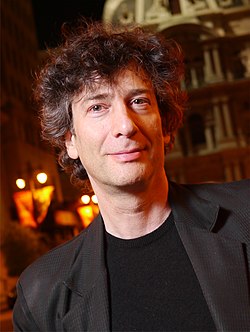Neil Gaiman Quote
Fiction can show you a different world. It can take you somewhere you've never been. Once you've visited other worlds, like those who ate fairy fruit, you can never be entirely content with the world that you grew up in. Discontent is a good thing: discontented people can modify and improve their worlds, leave them better, leave them different.And while we're on the subject, I'd like to say a few words about escapism. I hear the term bandied about as if it's a bad thing. As if escapist fiction is a cheap opiate used by the muddled and the foolish and the deluded, and the only fiction that is worthy, for adults or for children, is mimetic fiction, mirroring the worst of the world the reader finds herself in.If you were trapped in an impossible situation, in an unpleasant place, with people who meant you ill, and someone offered you a temporary escape, why wouldn't you take it? And escapist fiction is just that: fiction that opens a door, shows the sunlight outside, gives you a place to go where you are in control, are with people you want to be with(and books are real places, make no mistake about that); and more importantly, during your escape, books can also give you knowledge about the world and your predicament, give you weapons, give you armour: real things you can take back into your prison. Skills and knowledge and tools you can use to escape for real.As JRR Tolkien reminded us, the only people who inveigh against escape are jailers.
Fiction can show you a different world. It can take you somewhere you've never been. Once you've visited other worlds, like those who ate fairy fruit, you can never be entirely content with the world that you grew up in. Discontent is a good thing: discontented people can modify and improve their worlds, leave them better, leave them different.And while we're on the subject, I'd like to say a few words about escapism. I hear the term bandied about as if it's a bad thing. As if escapist fiction is a cheap opiate used by the muddled and the foolish and the deluded, and the only fiction that is worthy, for adults or for children, is mimetic fiction, mirroring the worst of the world the reader finds herself in.If you were trapped in an impossible situation, in an unpleasant place, with people who meant you ill, and someone offered you a temporary escape, why wouldn't you take it? And escapist fiction is just that: fiction that opens a door, shows the sunlight outside, gives you a place to go where you are in control, are with people you want to be with(and books are real places, make no mistake about that); and more importantly, during your escape, books can also give you knowledge about the world and your predicament, give you weapons, give you armour: real things you can take back into your prison. Skills and knowledge and tools you can use to escape for real.As JRR Tolkien reminded us, the only people who inveigh against escape are jailers.
Related Quotes
About Neil Gaiman
Gaiman's awards include Hugo, Nebula, and Bram Stoker awards and Newbery and Carnegie medals. He is the first author to win the Newbery and the Carnegie medals for the same work, The Graveyard Book. The Ocean at the End of the Lane was voted Book of the Year in the British National Book Awards, and it was adapted into an acclaimed stage play at the Royal National Theatre in London.
Beginning in 2024, news outlets published sexual assault accusations against Gaiman by numerous women. This affected or halted production on several adaptations of his work. One accuser sued Gaiman and his estranged wife Amanda Palmer for rape and human trafficking. Gaiman has denied these allegations.
